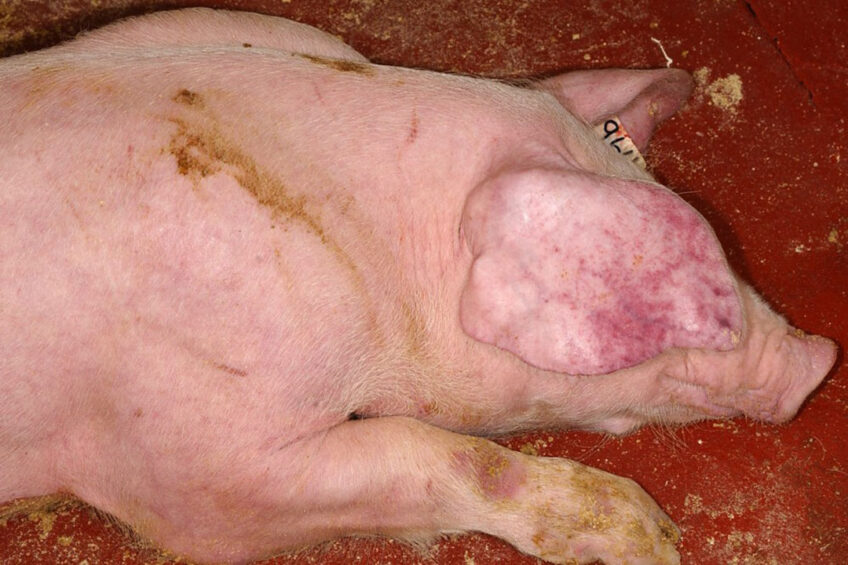ASF Dominican Republic: Virus shows ‘spectrum’ of disease

Researchers have observed that African Swine Fever virus (ASFv) can lead to a ‘spectrum’ of clinical disease, depending on how the virus was inoculated. That was noted when experimentally inoculating pigs with ASFv obtained in the Dominican Republic.
The researchers observed that pigs inoculated with virus intramuscularly developed an acute disease, whereas animals inoculated via an oro-nasal route developed a heterologous pattern of disease kinetics. The outcomes are in accordance with how the virus developed in the field in the Dominican Republic, where inconsistent disease patterns were also observed.
The research outcome was published by researchers at the US Plum Island Animal Disease Center, with scientists from both the Agricultural Research Service (ARS) and the Animal and Plant Health Inspection Service (APHIS), both organisations of the US Department of Agriculture. The research was published in the peer-reviewed journal, Viruses, which was published mid-May 2022.
Characterising phenotype of ASFv field strain
The authors concluded: “This is the first report characterising the virulent phenotype of an ASFv field strain isolated from samples collected in the Dominican Republic during the 2021 outbreak and provides information that may be used in developing epidemiological management measures to control ASF on the island of Hispaniola.”
The results are quite remarkable as the particular isolate used belongs to genotype II and is 99.99% identical to the Georgia 2007 strain. The researchers, therefore, write that the outcomes are “in sharp contrast to the demonstrated virulence of the ASFv Georgia 2010 isolate”. In the Dominican Republic, the virus strain was isolated from a field sample in Espaillat province in July 2021. It was named ASFv-DR21.
Trial with female crossbred pigs
The research team conducted 3 trials with 3 groups of 5 female crossbred domestic pigs between 36 kg and 41 kg. They were either…
· Inoculated intramuscularly; or
· Inoculated oro-nasally with that virus strain; or
· Co-housed with the intramuscularly inoculated animals to evaluate virus transmission and disease manifestation.
The researchers wrote: “Animals inoculated intramuscularly developed an acute disease leading to humane euthanasia at approximately day 7 post-inoculation. Interestingly, animals inoculated via the oro-nasal route developed a heterogeneous pattern of disease kinetics. One animal developed an acute form of the disease and was euthanised on day 7 post-inoculation, another animal experienced a protracted presentation of the disease with euthanasia by day 16 post-inoculation, and the remaining 2 animals presented a milder form of the disease, surviving through the 28-day observational period.”
The team also noted that the animals also presented with a heterogenous presentation of the disease. “Three of the animals presented protracted but severe forms of the disease being euthanised at days 14, 15 and 21 post-inoculation. The other 2 animals presented with a milder form of the disease, surviving the entire observational period.”
ASFv-specific antibody response
“In general, virus titres in the blood of animals in all study groups closely followed the clinical presentation of the disease, both in length and extent. Importantly, all animals presenting with a prolonged form of the disease, as well as those surviving throughout the observational period, developed a strong ASFv-specific antibody response.”
The team concluded: “These results suggest that the strain found in the Dominican Republic, unless inoculated parenterally, produces a spectrum of clinical disease, with some animals experiencing an acute fatal form while others presented with a mild transient disease accompanied by the induction of a strong antibody response.”
The research paper was authored by Elizabeth Ramirez-Medina, Ediane Silva, Nallely Espinoza, Lauro Velazquez-Salinas, Douglas P. Gladue and Manuel V. Borca, ARS, USDA, Greenport, NY, United States; and Vivian O’Donnell, Karen Moran, Dee Ann Daite, Roger Barrette, Bonto Faburay and Robin Holland, APHIS, USDA, Greenport, NY, United States.







